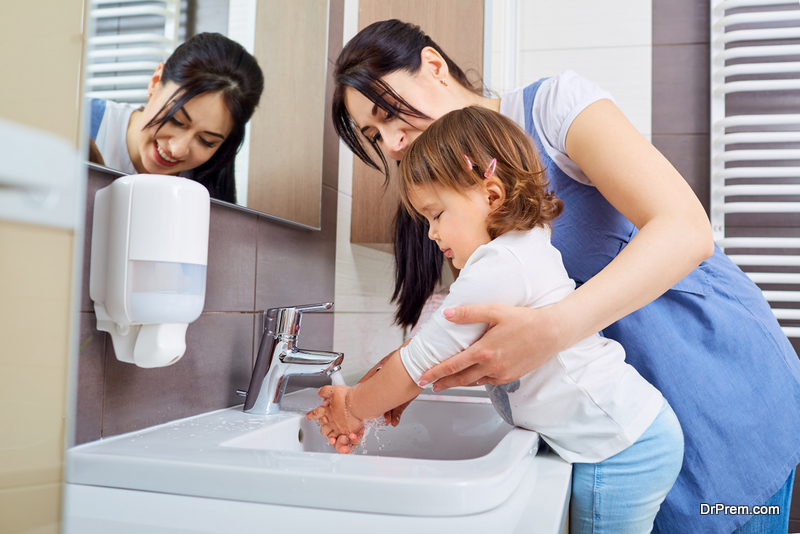Establishing healthy habits while your children are young is one of the best ways to teach your little ones about self-care. Make the following activities part of your daily routine to help them prioritize their wellbeing from an early age.
1. Practice Good Hygiene
 When you’re sick, you often rely on others to take care of you. In most cases, it’s difficult to nurse yourself back to health, making self-care practically impossible. Therefore, it’s important to help your little one stay disease and illness free by teaching them good hygiene skills.
When you’re sick, you often rely on others to take care of you. In most cases, it’s difficult to nurse yourself back to health, making self-care practically impossible. Therefore, it’s important to help your little one stay disease and illness free by teaching them good hygiene skills.
Model handwashing, toothbrushing and frequent showers and instruct them in how to care for their bodies. Of course, they’ll need a little help at first, but they’ll catch on eventually. Once they can stick to a hygiene routine independently, you won’t have to monitor their hygiene habits. Plus, they’ll have a strong foundation for self-care as they grow and reach adulthood.
2. Cook and Eat Together
A healthy diet is also key to maintaining good physical and mental health. Teach your child to care for their mind and body by inviting them into the kitchen. Let them peel fruit, chop vegetables and mix ingredients as you cook a few nutritious meals together. Explain why some foods are healthier than others and show them how to make more mindful substitutions.
Encouraging healthy eating habits can also promote self-care as your child grows. Eat regularly and enjoy nourishing snacks throughout the day. Drink a glass of water together before each meal and avoid sugar highs. Satisfy their sweet tooth with dried fruit, granola parfaits and frozen yogurt. Then, every once in a while, indulge in a favorite unhealthy food. It’s all about finding balance, right?
3. Move and Breathe
 Physical activity also plays a crucial role in taking care of yourself. When you exercise, your body releases serotonin and endorphins that can boost your mood and energy levels. The same is true for little kids. Preschool-age children need to be active throughout the day, while kids between the ages of six and 17 need at least one hour of exercise each day.
Physical activity also plays a crucial role in taking care of yourself. When you exercise, your body releases serotonin and endorphins that can boost your mood and energy levels. The same is true for little kids. Preschool-age children need to be active throughout the day, while kids between the ages of six and 17 need at least one hour of exercise each day.
Encourage your little ones to get moving by going on walks, playing catch, tag and other yard games and working out together. You might also pair deep breath with movement and take up yoga, tai chi or other meditative practices. As your child participates, they’ll create a mind-body connection that will help them tune into their emotions and take better care of themselves.
4. Prioritize Downtime
Everyone can benefit from a consistent routine. However, it’s wise to leave a few hours of your day open for downtime. Don’t schedule any chores or activities during this time. Instead, leave room for open-ended play and creative exploration.
Prioritizing downtime by clearing your schedule will help you eliminate stress and recognize your child’s interests. Remember, their idea of self-care might not match yours. Therefore, it’s wise to expose your child to a variety of different activities and create space for them to explore their passions. Ask them what they want to do during downtime and observe from afar to better understand what self-care looks like to them.
6. Enjoy the Outdoors
 The average American will spend 90% of their life indoors. Yet, humans rely on nature to survive. Plus, vitamin D from the sun’s rays can boost your mood and improve mental health. So why not get outside and appreciate the great outdoors. Go for a hike, plan a scavenger hunt or organize another activity to teach your child to appreciate nature.
The average American will spend 90% of their life indoors. Yet, humans rely on nature to survive. Plus, vitamin D from the sun’s rays can boost your mood and improve mental health. So why not get outside and appreciate the great outdoors. Go for a hike, plan a scavenger hunt or organize another activity to teach your child to appreciate nature.
If you live north of Atlanta, Georgia, it’s virtually impossible to receive vitamin D from the sun during the winter months. The sun simply doesn’t rise high enough to provide this essential nutrient. However, enjoying time in nature may still help you and your little one release some energy, decompress and calm your minds. Try to spend a few minutes outdoors each day to reap the benefits.
7. Talk about Emotions
Understanding your own feelings can help you pinpoint emotional triggers and develop coping skills. The same goes for your kids. By teaching them about emotions and validating their feelings, you can help them become mentally strong.
Help your little ones understand their emotions by having open conversations about them. Begin by teaching your preschooler basic words to describe their feelings like happy, sad, mad and scared. Then, teach them to recognize these emotions in others’ body language and facial expressions. Ask your child how they feel each day and discuss each emotion together. Then, continue to encourage them to use their words instead of actions to relay their feelings to others.
Monkey See, Monkey Do
Your little one is always watching you, for better or worse. Show them what self-care in practice looks like by being a great role model. Nourish your body with movement, good food and fresh air. Prioritize quiet time alone, even if it’s for a few minutes each day. Share your emotions and be your authentic self. As you care for your physical, mental and emotional wellbeing, your child will undoubtedly imitate your actions and develop a routine of their own. Remember, change begins with you.
Article Submitted By Community Writer




